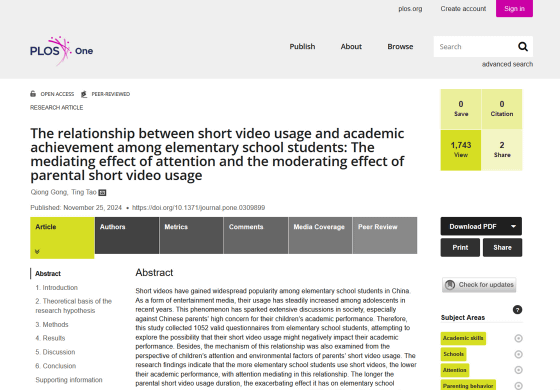Research shows that children who spend more time watching short video apps like TikTok have poorer academic performance

Short video sharing platforms such as TikTok have gained huge popularity around the world, but many parents are concerned that their children's use of these apps may lead to a decline in their academic performance. A Chinese research team investigated the relationship between the use of short video sharing platforms and academic performance and found that the longer children spend on short video sharing platforms, the lower their academic performance.
The relationship between short video usage and academic achievement among elementary school students: The mediating effect of attention and the moderating effect of parental short video usage | PLOS ONE

New TikTok research: Short video use linked to lower academic performance in children
https://www.psypost.org/new-tiktok-research-short-video-use-linked-to-lower-academic-performance-in-children/
Chinese parents are keen on their children's education, but short video-sharing platforms such as Douyin and Kuaishou , the Chinese version of TikTok, are popular among children, sparking debate over the impact these platforms have on children's academic performance.
To investigate the relationship between the use of short video sharing platforms and academic performance, a research team from the Chinese Academy of Sciences conducted a study on 1,052 elementary school students attending elementary schools in urban and suburban areas of Shenzhen .
The study involved elementary school students completing a survey about their short video sharing platform usage habits, and parents were also asked about their own media use and their children's screen time. The study also assessed the students' attention with tests designed to measure attention span, stability, allocation and shifting, and assessed academic performance through official test scores in core subjects.

Analysis of the collected data showed that there was a significant negative correlation between the amount of time elementary school students spent using short video sharing platforms and their academic performance. In other words, the longer children spent using short video sharing platforms, the worse their academic performance.
There was also a negative correlation between the use of short video sharing platforms and attention, with elementary school students who watched a lot of short videos finding it difficult to stay focused on their academic tasks. Furthermore, poor attention has been reported to be correlated with lower academic performance, suggesting that attention is a potential pathway linking the use of short video sharing platforms and academic performance.
Furthermore, the study found that the more time parents spend using short video sharing platforms, the stronger the negative correlation between their children's screen time and attention. This correlation can be explained by children imitating their parents' habits and attitudes. It has also been pointed out that parents' long screen time can reduce parent-child interaction, which may affect children's concentration and learning.
On the other hand, parents' limited use of short video sharing platforms mitigated the negative effects of screen time on children's attention. These findings suggest that the home environment may have a potential impact on children's media habits and cognitive function.

Future longitudinal studies and/or the integration of objective behavioral measures such as eye tracking may allow for a more accurate assessment of the association between attention and media use, and may also generalize findings to more diverse cultural and geographical populations.
The research team said, 'This study provides practical guidance for schools and families and lays the foundation for future research.' 'These findings pave the way for exploring innovative approaches that integrate home education and media literacy, and facilitate the translation of research results into practical methodologies for education.'
Related Posts:
in Education, Web Service, Science, Smartphone, Posted by log1h_ik







